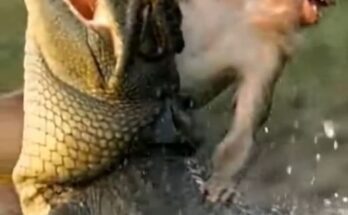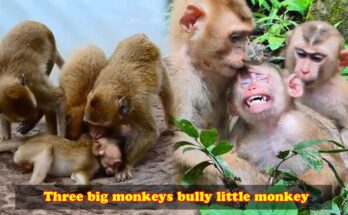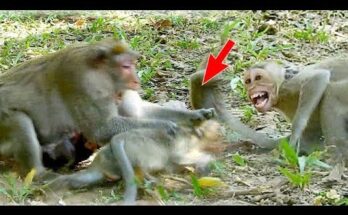The mother monkey, exhausted yet alert, had just brought a tiny new life into the world. Her baby, fragile and trembling, lay quietly on the soft ground, still slick from birth. Instinctively, the mother began the careful and delicate process of cleaning her newborn. With gentle, precise movements, she licked away the birth fluids, making sure the baby’s fur was clean and dry. Every touch was tender, every motion filled with protective care.
The baby monkey, sensing the warmth and safety of its mother, instinctively clung to her, still weak and adjusting to the world outside the womb. The mother’s eyes, bright and vigilant, scanned their surroundings, alert to any danger. Even in the moment of intimate care, her instinct to protect her child never wavered.
As she continued to groom the baby, the mother nudged it softly, encouraging it to move and helping it find its tiny limbs. Her soft grooming also stimulated the baby’s circulation and breathing, crucial in those first few moments of life. Occasionally, she paused to sniff the surroundings, ever watchful, before returning to her newborn with even greater care.
Other monkeys nearby watched quietly, recognizing the sacredness of this new beginning. The mother’s actions were not just about cleanliness; they were the first lessons in survival, comfort, and trust. With each careful lick and gentle touch, she established a bond that would guide the baby through its early, vulnerable days.
Finally, the baby monkey, now cleaner and slightly more alert, nestled closer into the mother’s embrace. The mother’s grooming had not only ensured the newborn’s health but also reinforced a profound emotional connection that would last a lifetime. In this serene moment, life had begun anew, framed by instinct, care, and the powerful bond between mother and child.


